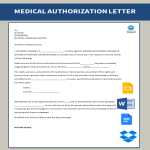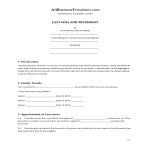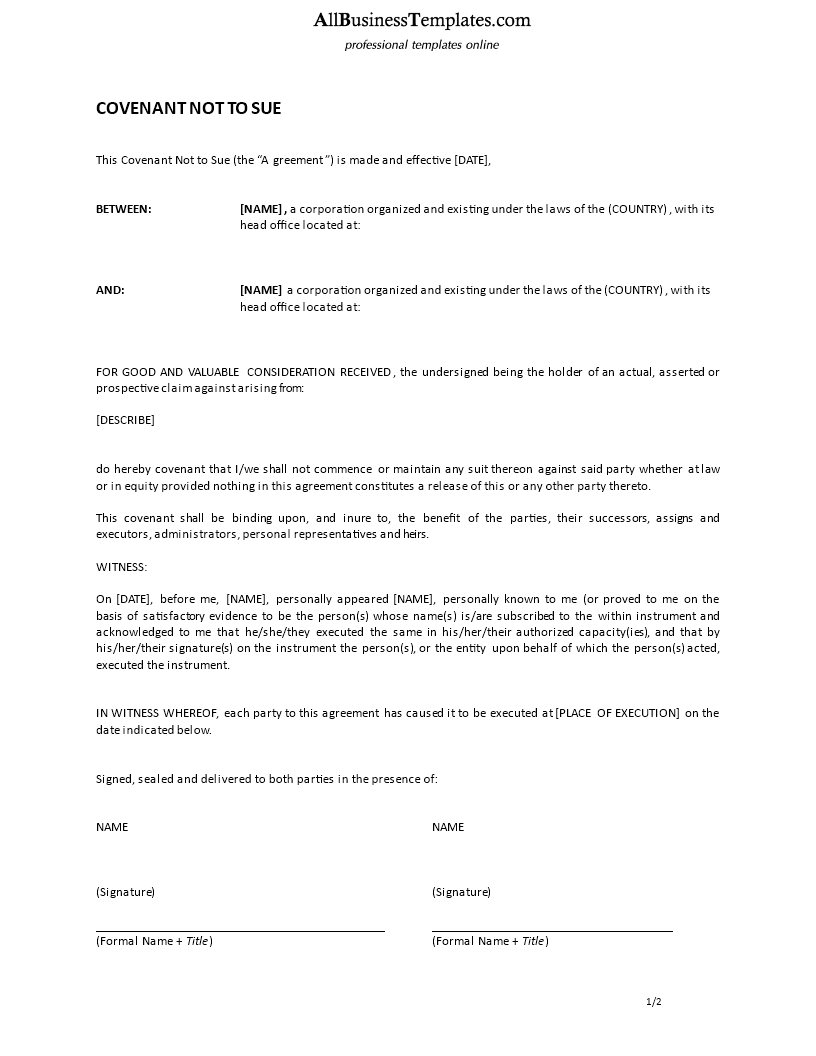Covenant Not to Sue
Save, fill-In The Blanks, Print, Done!

Download Covenant Not to Sue
Microsoft Word (.docx)Or select the format you want and we convert it for you for free:
- This Document Has Been Certified by a Professional
- 100% customizable
- This is a digital download (35.43 kB)
- Language: English
- We recommend downloading this file onto your computer.
What does a covenant not to sue mean? When forming a covenant not to sue, how do you go about it? Download our sample template that you can download and use. It includes all the necessary information you need to protect your company from legal action. It also provides a clear record of the agreement.
A Covenant Not to Sue (CNS), also known as a Release and Covenant Not to Sue, is a legally binding agreement between two parties in which one party (the releasor) agrees not to sue or bring legal action against the other party (the releasee) for specific claims, disputes, or liabilities. It is a legal contract commonly used to settle or resolve disputes and prevent future litigation.
Key points to understand about a Covenant Not to Sue:
- Purpose: The primary purpose of a CNS is to reach a mutually acceptable resolution to a legal dispute or potential claim. It offers a way to avoid the time, expense, and uncertainty of litigation.
- Scope: The scope of the CNS is defined in the agreement. It specifies the claims, disputes, or potential causes of action that are being resolved, and it typically includes a broad description of the legal matters being addressed.
- Consideration: In exchange for agreeing not to sue, the releasor often receives something of value, known as "consideration." This consideration can take various forms, such as a payment, a promise not to pursue counterclaims or other benefits.
- Waiver of Rights: By signing the CNS, the releasor voluntarily waives their right to file a lawsuit or legal action related to the specified claims. This waiver is legally binding and enforceable.
- Legal Effect: A properly executed CNS is a legally enforceable contract, and if one party breaches the agreement by pursuing legal action, the other party can seek remedies for the breach.
- Confidentiality: CNS agreements may include provisions for confidentiality, restricting the parties from disclosing the terms of the settlement to third parties.
- Exclusivity: In some cases, a CNS may include a provision stating that the agreement is the exclusive remedy for the disputes covered by the agreement, effectively preventing the releasor from pursuing alternative legal actions.
- Non-Admission of Liability: CNS agreements often include language stating that the releasee does not admit any liability or wrongdoing by entering into the agreement. This is a way to protect the releasee's reputation and legal position.
- Legal Advice: It is advisable for both parties involved in a CNS to seek legal advice before signing the agreement to ensure they understand the implications and consequences. Legal counsel can help draft, review, and negotiate the terms of the CNS.
- Finality: Once a CNS is signed and executed, it generally marks the final resolution of the specific claims or disputes covered by the agreement, and the releasor cannot revisit the matter in court.
Covenants Not to Sue are commonly used in various contexts, including personal injury settlements, commercial disputes, employment matters, and intellectual property disputes. They offer a way for parties to reach a compromise, avoid protracted litigation, and bring closure to contentious issues while preserving legal rights in areas not covered by the agreement.
A covenant not to sue legally obliges a party that could initiate a lawsuit not to do so. The covenant is specifically made between two parties, and any third party that wants to make a claim is legally allowed to do so. Covenants not to sue are used to settle specific legal issues outside of the court system. Parties may enter into this type of agreement in order to prevent a protracted, expensive lawsuit. In exchange for the covenant, the party that could seek damages may be provided with compensation or may be given assurances that the other party in the agreement will conduct a specific action.
DISCLAIMER
Nothing on this site shall be considered legal advice and no attorney-client relationship is established.
Leave a Reply. If you have any questions or remarks, feel free to post them below.
Related templates
Latest templates
Latest topics
- GDPR Compliance Templates
What do you need to become GDPR compliant? Are you looking for useful GDPR document templates to make you compliant? All these compliance documents will be available to download instantly... - Google Docs Templates
How to create documents in Google Docs? We provide Google Docs compatible template and these are the reasons why it's useful to work with Google Docs... - IT Security Standards Kit
What are IT Security Standards? Check out our collection of this newly updated IT Security Kit Standard templates, including policies, controls, processes, checklists, procedures and other documents. - Letter Format
How to format a letter? Here is a brief overview of common letter formats and templates in USA and UK and get inspirited immediately! - Google Sheets Templates
How to work with Google Sheets templates? Where to download useful Google Sheets templates? Check out our samples here.
cheese




